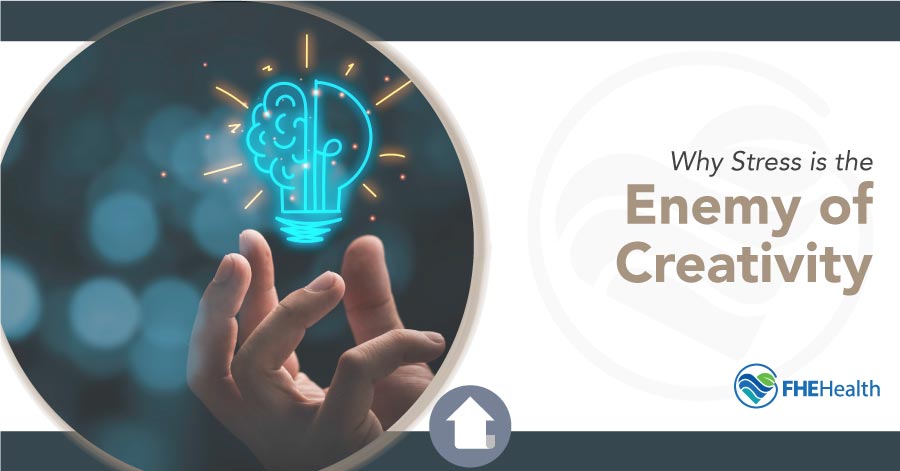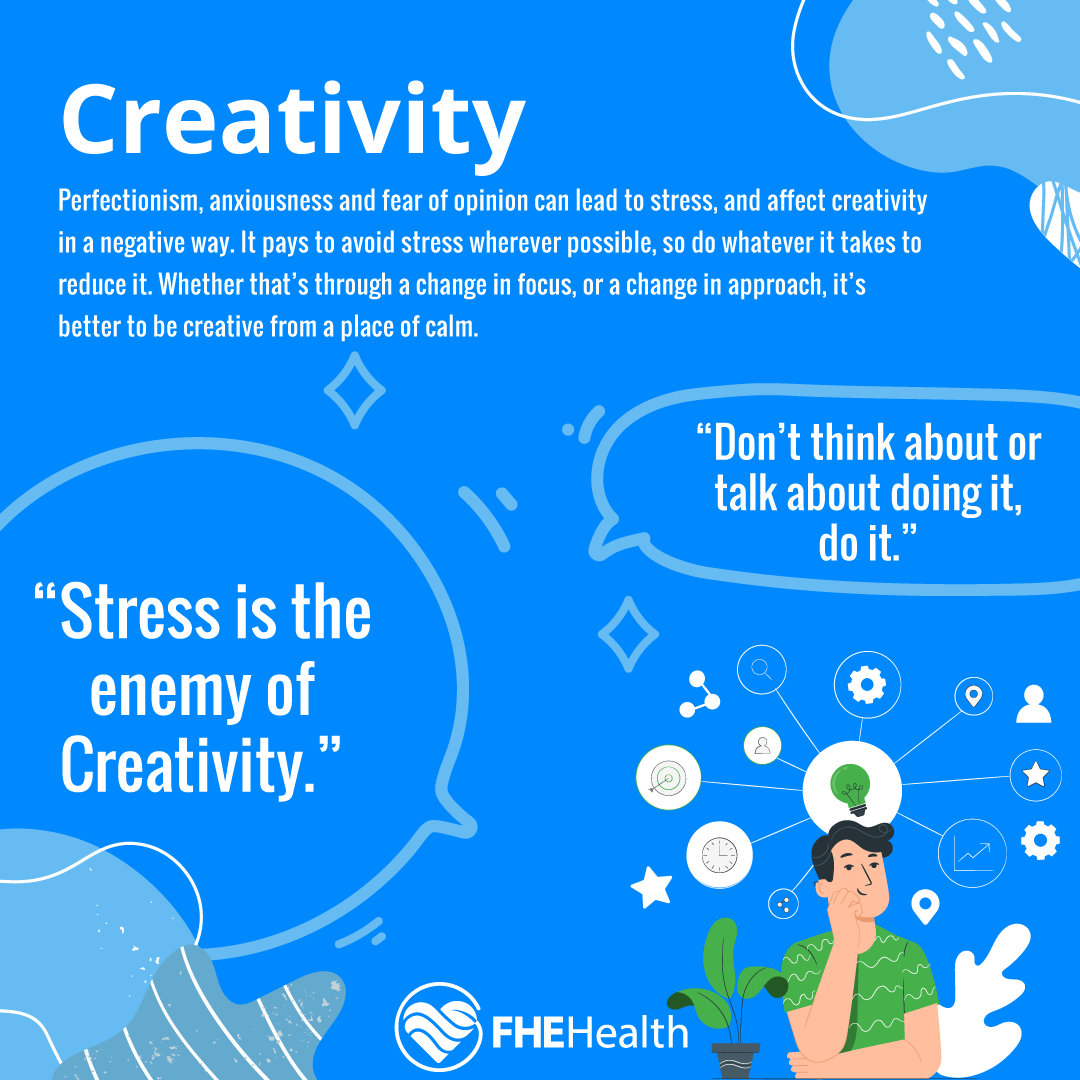
“Stress is the enemy of creativity. Our best work often comes from a state of nonchalance, when our minds are calm.” — Will Meier, “The Next Web”
People often think of creativity as being the source of art, music, and films, but many people’s work requires them to generate new ideas. Trying to do creative work is a catch-22 because it should be something enjoyable and free-flowing, but doing it for work can somehow steal the joy out of it. This article covers what creativity is, what’s going on in the creative brain, the concept of creativity under stress, and how to manage your stress so you can enjoy your creative work.
Treatment can begin quickly and discreetly, get started now Creativity is defined as the ability to come up with new and innovative ideas. It’s often associated with artistic endeavors, but can also apply to practical problems like developing businesses or resolving social issues. Whether the new idea is a narrative for a short story or a blueprint for engineering a new sustainable light, it requires that certain inner spark we know as creativity. While explaining what creativity is may be straightforward, the process of coming up with new ideas is still mysterious. Scientists have only begun to unravel the secrets of the creative brain. One study found that creative people tend to have higher levels of activity in their brain’s right hemisphere. Creativity has also been linked to increased levels of dopamine, a neurotransmitter that regulates pleasure and motivation. Moreover, looking at creativity from the standpoint of networks in the brain offers a fascinating insight. The brain has several functional networks: the salience network, the executive control network, and the default mode network. The executive control network is responsible for focused attention, whereas the default mode network is active during mind wandering and daydreaming. These two networks are usually mutually exclusive, meaning they’re rarely both active at the same time. The interesting thing about creativity is that these two networks cooperate. It’s the only time both networks are simultaneously active, and it manifests as a type of controlled mind-wandering that gives birth to new, creative ideas. While there’s still much to learn about creativity, these findings provide insight into what’s happening in our brains when we’re engaged in creative work. When a stressful event occurs, cortisol levels in our body rise, causing a cascade of physiological, psychological, and neurological changes. Our bodies heat up, often causing perspiration; our heartbeat increases, and we feel a sense of discomfort or being on edge. Just like creativity, activity (or lack thereof) in the executive control and default mode networks plays a role in stress. The executive control network becomes less active, and the default mode network becomes more active. Because the process of creativity relies on a harmonious balance between these two networks, the happen can disrupt creativity under stress, putting an end to our brain’s ability to be creative. This may be why doing creative work under time pressure can be counterproductive. The stress of the time pressure can actually take away from our brain’s ability to generate new, innovative ideas. It’s been said that deadlines destroy creativity. If you’re under time pressure at work to do a creative task, this can lead to a vicious cycle of feeling stressed and inadequate. On the one hand, you want to please your boss by offering good work within your given deadline, but the time pressure itself is hindering you. Don’t let it get you down, and try to understand that it’s not that you’re inadequate in any way — biology is working against you in this case. Ready to start? More questions about treatment? Creativity is notoriously elusive, and people are always looking for that magic hack to ignite their creative spark. While there’s no magic trick to turn you into Pablo Picasso, there are some factors that can lead to enhanced creativity. They include: It’s also a good idea to be well-rested when you need to be creative. As the saying goes, “When you’re tired, you’re uninspired.” The answer to this isn’t black and white. While stress has a memory-enhancing effect and can increase memory retention when studying for important exams, it’s also been found to reduce productivity. In short, creativity under stress may vary greatly, being helpful or harmful to your work, and it largely depends on what type of work you’re doing. If you’re studying and are under a little bit of “healthy” stress, you might perform better on an exam than if stress was totally absent. However, prolonged or severe stress will always impair your ability to function, reducing the quality of your work. If you’re struggling with stress, make time to decompress and deal with it before it spirals out of control. If you feel like you need help, reach out for it. Achieving creativity under stress isn’t easy, especially when working under the pressure of the clock isn’t easy — indeed, our very biology hardly permits it. However, sometimes your work might require you to do just that. Here are a few tips for reducing stress: Creativity is often difficult enough to catch without the added factor of stress hindering our creative brain. And while a little bit of stress is normal, too much can have negative long-term effects. If you’re struggling to manage your stress, don’t be afraid to reach out for help. Contact FHE Health by calling us today at (844) 299-0618. Treatment can begin quickly and discretely, get started now Chris Foy is a content manager and webmaster for FHE Health with years of experience in the addiction treatment industry...read moreNeed Help?
What Is Creativity?
Creativity and the Brain
Does Stress Affect Creativity?
Begin your recovery today
When Does Creativity Flourish?
Can You Work Better Under Stress?
Tips for Managing Stress During Creative Work
Start Treatment Now
![]()
About Chris Foy
Footer







